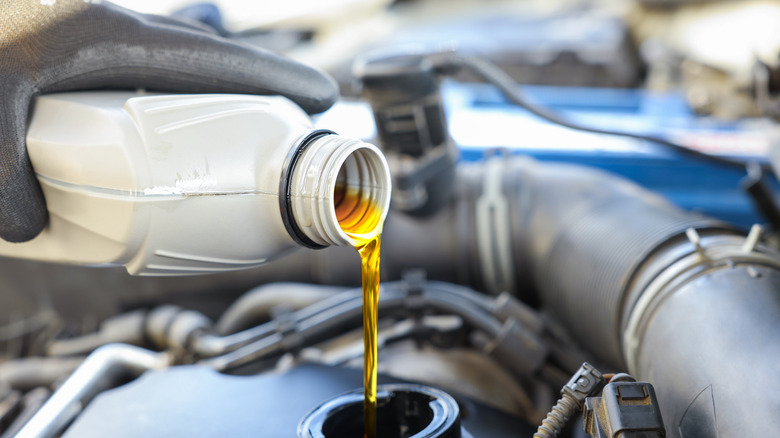Can You Use Synthetic Oil In An Older Engine?
Synthetic motor oil offers many advantages over conventional engine oil. Synthetics resist chemical degradation far better than traditional oils, and they typically have a higher viscosity index that enables them to better protect against friction during intense heat, extreme cold, or anything in between. The exceptional stability, low volatility, and artificial chemical compounds of fully synthetic oils have given them an exceptionally longer service life than conventional oils, with some extending beyond 10,000 miles between oil change intervals.
Although synthetic motor oil can cost two to four times as much as conventional oil, the benefits are worth the protection and longevity, which is why nearly 70% of new cars sold in 2019 left the factory with synthetic oils in their engines. All this information is fine and dandy for new or slightly newer cars, but what if you have an older model car? Will an older engine survive on synthetic oil?
Fortunately, synthetic oils will not harm older engines, and it doesn't matter if you have a Ford Model T, one of the great JDM cars of the 90s, or an older diesel truck. Moreover, synthetic motor oils are backward compatible with older engines, and switching from conventional to synthetic does not require an additional break-in period. Despite costing more, synthetic oil will make your older car more fuel efficient, run smoother, and help save you money through longer oil change intervals.
Are synthetic oils are bad for older engines?
Synthetic-blend motor oils have been around since the 1970s, and the earliest formulas contained chemical compounds called esters, which help clean the engine and get rid of contaminants and engine sludge that could otherwise prove detrimental to performance and efficiency. Additionally, the chemical compounds of ester provide lubrication to the rubber or rubberized engine seals, making them more tensile without drying or cracking the material.
However, excessive or prolonged exposure to ester has its disadvantages as well. The compounds tend to cause the seals to swell and lead to oil leaks, which has contributed to the urban legend regarding the compatibility of synthetic motor oils with older engines. Modern synthetic oil no longer contains compounds that could harm engine seals and other components. as evidenced by Porsche's insistence on using multi-grade synthetic motor oils for early 911s, the 914, and even the timeless classic Porsche 356.
More important than choosing between synthetic or conventional oil is adhering to the manufacturer's recommendation for oil viscosity and oil change intervals. For this, it's prudent to refer to the owner's manual. Finally, there are in high-mileage synthetic oil formulas on the market, intended for older cars with over 75,000 miles on the odometer.
These blends contain more specific additives that fill the microscopic cracks on internal metal surfaces, allowing the engine to run smoother for longer, along with more detergents to prevent the formation of sludge. The only downside is the cost, as high-mileage synthetic oils command a significant price premium. However, the benefits are worth the extra expense.

